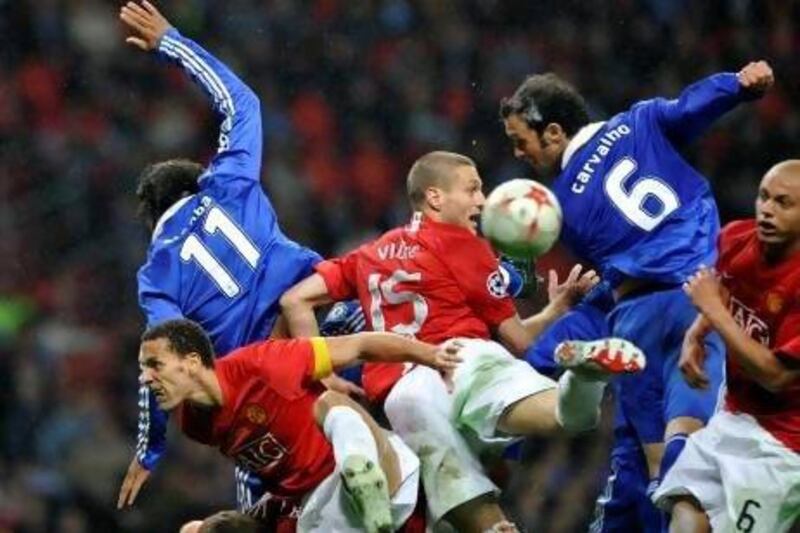"Maybe," said Laurent Blanc with a glint in his eye, "we can do a Greece." The head coach of France knew the quote would make headlines the next day. It sounded such an odd idea: here were France, twice champions of Europe, and World-Cup holders during Blanc's time as a player, aspiring to be as good as the least likely title-holders in international football of the 21st century.
The memory of Greece's triumph at Euro 2004 has assumed a faded quality over the past eight years, perhaps because it was freakish, perhaps because the football Otto Rehhagel's workmanlike Greek team played to defeat the likes of France and the hosts Portugal on the way to that upset was not especially elegant.
Or perhaps because the game becomes so accustomed to seeing a select group of favourites master the major competitions of world football and generally share the big prizes among themselves that we forget the oddball insurgents.
Yet football's hierarchies, however established they may seem by the importance of capital and economic might, do change.
"The games goes in cycles," coaches and analysts endlessly say, without defining the length or the nature of a cycle. Ask Blanc and he would tell you that France's national team's cycle peaked around 2000, when they followed a World Cup success in 1998 with the trophy at the Euros, then began a dip: he is still not sure how far Les Bleus have climbed out of the nadir of the last World Cup, which is why he liked to put France in the category of underdogs, using Greece as his shorthand.
Or perhaps Blanc spotted that 2012 has something of the character of 2004 in football terms. The year began, in both cases, with new names on an important cup: in 2004 Tunisia became African champions for the first time; in 2012, Zambia achieved their first continental victory. Coincidence?
Maybe, though it may be worth noting that the previous time the African Cup of Nations had etched a new name on its biennial role of honour had been eight years before that, in 1996.
In club football, the eight-year itch can also look like a habit. Remember that a couple of months before Greece upset expectations by lifting the national title of Europe, clubs from France and Portugal had contested the Champions League final, Porto defeating Monaco. That was unprecedented in the modern era.
Never, since the European Cup became the Champions League, had a team from Portugal won it; only Marseille in the early 1990s, had ever represented Ligue 1 in a final.
Now look at the make-up of the teams in Friday's draw for the 2012 Champions League quarter-finals. Unless Chelsea overcome a deficit tonight against Napoli, there could, for the first time since 1996, be no English club left at this stage.
Basel had already set a new watershed in the Champions League era by putting a Swiss team into the last 16. A Russian presence survives into tonight, with CSKA Moscow taking a 1-1 first-leg draw to Real Madrid. Most remarkable of all are Apoel Nicosia, a club from Cyprus, in the last eight.
In an interview in the magazine The Blizzard, Sir Alex Ferguson, the the Manchester United manager, put the theory, which he said he had discussed with fellow experts, that "the greatest teams ever have a time span of seven years."
In the eighth season, standards would still be high, but perceptible slipping. The tools of the modern game are built around the idea that great players have eight peak years in them: player contracts, at least for footballers under 30, tend to be of around four years, so a good, happy footballer at a successful club might reasonably be expected to sign two of these.
Broadcast deals, around which successful clubs build their budgets, tend to be of around a four-year duration; as soon as one is signed, chairmen and presidents are lobbying to get more money over the next four-year deal.
In the context of European club football, political and legislative events have also shaped the logic of the eight-year cycle. Rewind to 1996 and you find Ajax of Amsterdam in the second of their successive Champions League finals.
Neither they, or any Dutch club, were to return to such an elevated stage. Why? The Bosman ruling of 1995 had given footballers freedom of movement and most of the players in a fine Ajax squad left for countries with stronger, richer leagues.
By 2004, when Porto briefly returned ownership of the Champions League to a club from a league outside the so-called Big Four, a new trend was gathering. Roman Abramovich had just bought Chelsea, who reached the semi-final in his first season of vast investment.
An era of English muscle-flexing was under way, as overseas investors followed Abramovich's lead. The majority shareholdings of Manchester United, Arsenal and Liverpool all changed, post-2004. English football then provided seven finalists in the Champions League between 2005 and 2011.
It is hasty to say that, with only Chelsea hanging on tonight in the last 16 stage, that era is over, but regulations which might turn out as significant as the Bosman law are shaping European football.
Uefa's Financial Fair Play guidelines will curtail spending among the big clubs. The last transfer window saw far lower outlays than a year earlier, and you can make an argument that the below-par showings of United, Arsenal and Chelsea in Europe this season are down to a to failure strengthen their squads in key positions.
So who's going to do a Greece or a Porto in 2012? It is surely fanciful to picture Apoel in the Champions League final, but if the draw is kind, perhaps a Benfica, aiming for a first semi-final in two decades, might sneak in to grab elite football's eight-yearly opening for an underdog.






